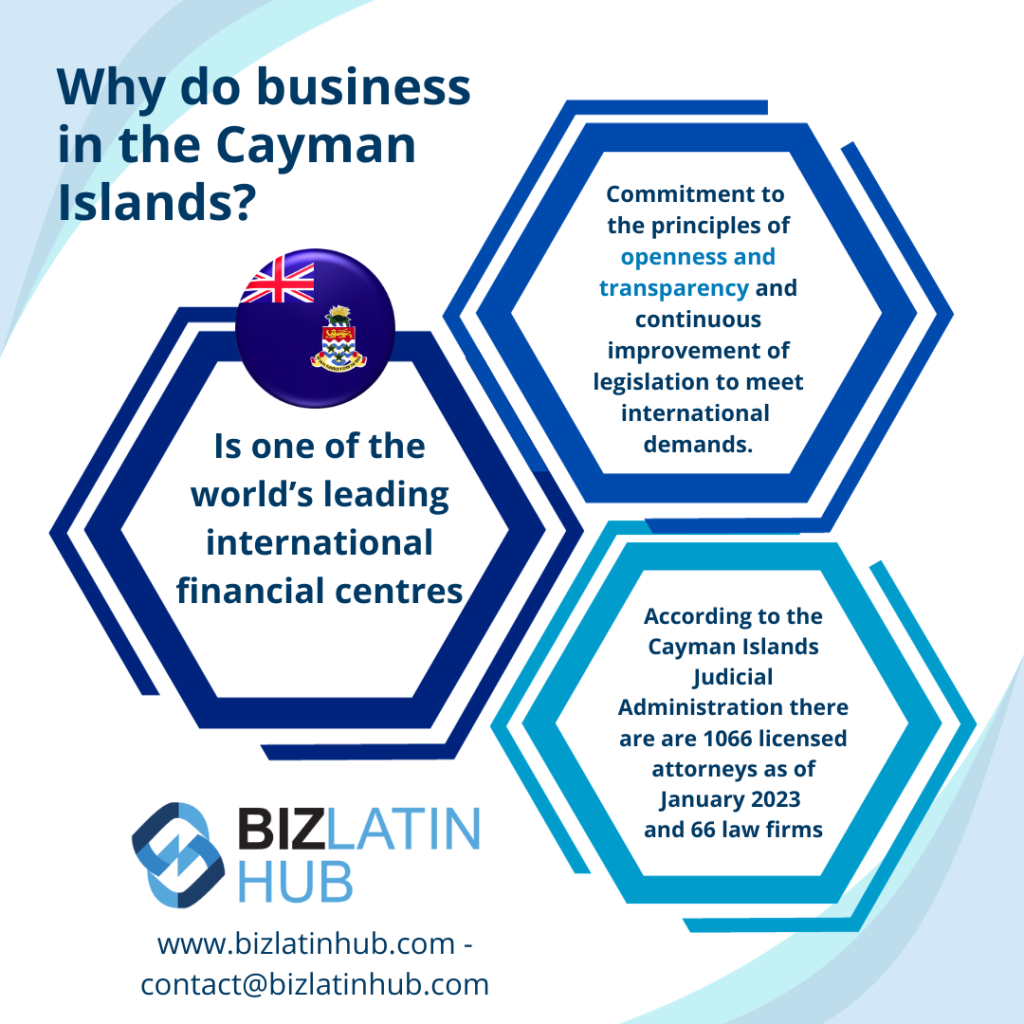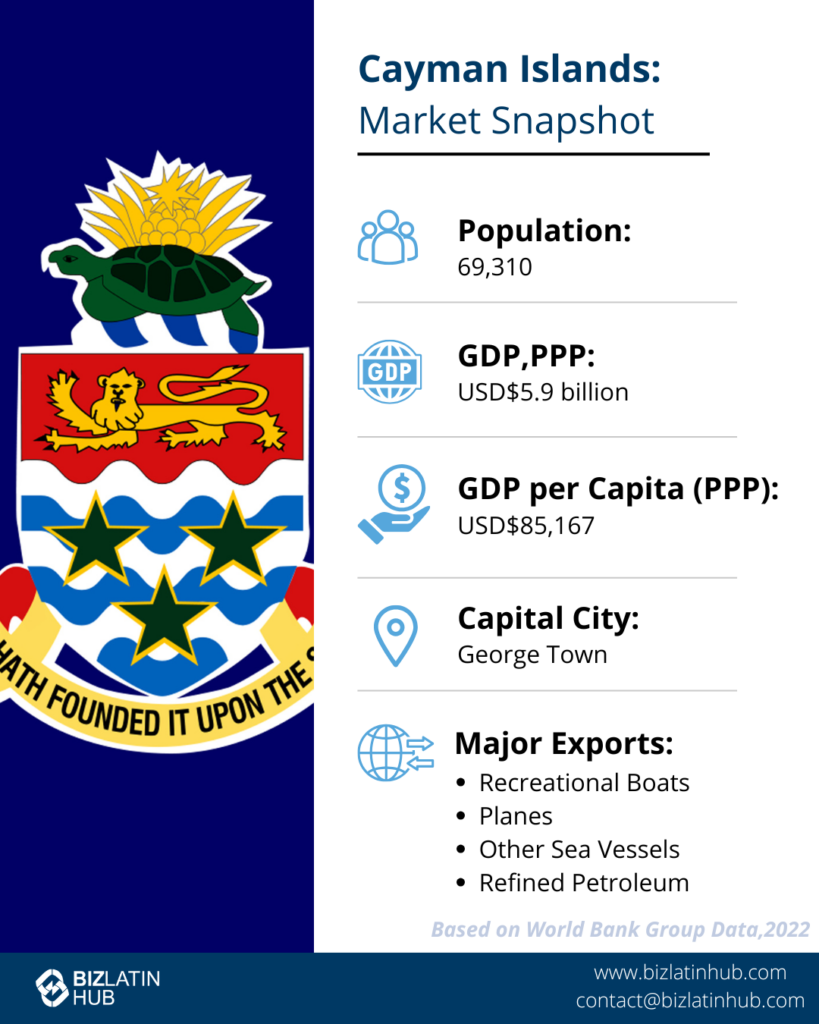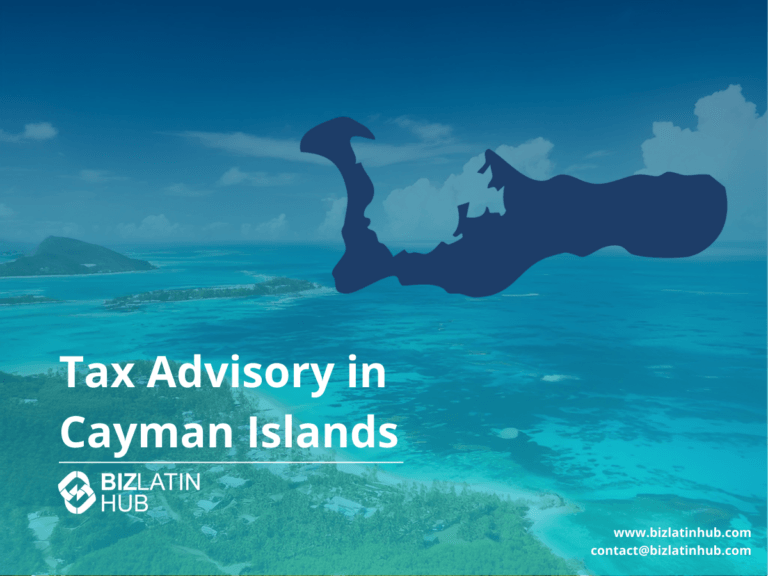The Cayman Islands attract global business interest for good reasons. Its legal framework offers various structures that cater to diverse business needs. Understanding these legal entities can empower entrepreneurs to make informed decisions before company formation in the Cayman Islands. Entities include exempt companies, limited liability companies, and ordinary companies. Each type serves unique purposes while providing tax neutrality and political stability. This framework is appealing to businesses seeking growth and protection. This guide details the features and primary uses of the main corporate structures available to help you choose the right one for your investment or business goals.
Key Takeaways: Legal Entity Types in the Cayman Islands
| What is the most common entity type for international business? | The Exempted Company. |
| What is the key feature of a Limited Liability Company (LLC)? | They offer a flexible management structure, adapting to members’ needs. |
| What is the key feature of an Exempted Company? | An Exempted Company offers tax neutrality and confidentiality. |
| Can all companies be 100% foreign-owned? | Yes, Cayman Islands allows full foreign ownership. |
| Are all businesses offshore? | Resident and Non-Resident companies are used for business involving the local economy. |
Main Offshore Company Types
1. The Exempted Company
This is the most common structure for international investors. It is tax-neutral, offers confidentiality (shareholder details are not public), and is designed for business conducted outside the Cayman Islands.
Exempt Companies are favored by foreign investors for their tax exemptions and ability to operate globally. These companies must conduct most activities outside the Cayman Islands and are barred from local trades without permissions. They can secure a 20-year renewable tax exemption certificate for offshore activities. Exempt companies don’t need annual general meetings, and their membership registers aren’t publicly accessible.
Expert Tip: Why “Exempted”?
From our experience, clients ask what the company is “exempted” from. An Exempted Company is not allowed to trade within the Cayman Islands (with locals). In exchange for this restriction, it is exempted from certain requirements (like holding an annual meeting in Cayman or keeping a public register of members) and can obtain a Tax Exemption Certificate guaranteeing no future taxes for 20 years. This certainty is its primary value proposition.
2. The Limited Liability Company (LLC)
This is a hybrid entity that blends the limited liability of a company with the operational flexibility of a partnership. It does not have shares and is governed by a private LLC agreement, making it popular for investment funds and joint ventures.
LLCs in the Cayman Islands provide limited liability protection, safeguarding personal assets from company debts. These entities are treated as partnerships for tax reasons, exempting them from local taxes. They offer a flexible management structure, adapting to members’ needs. Nevertheless, the process to establish an LLC can be intricate, requiring detailed legal steps, and they aren’t recognized worldwide.
The rise of the Cayman LLC
Introduced in 2016, the Cayman LLC was designed to mirror the Delaware LLC. It provides a flexible corporate structure with separate legal personality, but members can agree on their own internal governance rules in the LLC agreement. It is increasingly popular for Private Equity funds and joint ventures where the rigidity of a traditional corporation is not desired.
3. The Segregated Portfolio Company (SPC)
This is an Exempted Company with the ability to create legally segregated portfolios. It allows assets and liabilities to be ring-fenced within different portfolios, protecting them from cross-contamination.
Other Company Types for Local Operations
1. The Resident Company
This company type is for those who intend to conduct business locally within the Cayman Islands. It must be licensed under the Trade and Business Licensing Act.
Ordinary Companies function as resident companies with a registered office in the Cayman Islands. They facilitate local business operations and contract agreements. Such companies must adhere to annual reporting as per the registrar’s demands and obtain special licenses for specific activities like banking. However, they aren’t ideal for foreign investors seeking international operations or tax planning.
2. The Non-Resident Company
This structure is for companies that do not trade within the Cayman Islands but may wish to hold local assets or shares. It has largely been superseded by the Exempted Company structure.
3. Special Economic Zone Companies
SEZCos operate mainly outside the Cayman Islands, enjoying exemptions from local licensing. They benefit from a streamlined incorporation within ten days and five-year visas for employees. SEZCos are free from direct taxes, certain import duties, and work permit needs. They can thrive in dedicated business parks catering to sectors like technology and media.
| Characteristic | Exempt Companies | LLCs | Ordinary Companies | SEZCos |
|---|---|---|---|---|
| Primary Use | International business & investment | Flexible business structure | Local operations | Technology & innovation |
| Tax Status | 20-year tax exemption guarantee | Pass-through taxation | Subject to local fees | Tax exempt |
| Local Operations | Limited/Restricted | Permitted | Required | Within Special Economic Zone |
| Minimum Members | One shareholder | One member | One shareholder | One shareholder |
| Public Registry | Limited disclosure | Limited disclosure | More disclosure required | Limited disclosure |
| Annual Meetings | Not required | Not required | Required | Not required |
| Foreign Ownership | 100% permitted | 100% permitted | May be restricted | 100% permitted |
| Work Permits | Standard process | Standard process | Standard process | Fast-track 5-year visas |
| Setup Time | 3-5 days | 3-5 days | 3-5 days | ~10 days |
| Ideal For | Investment funds, holding companies | Partnerships, joint ventures | Local businesses | Tech companies, startups |
Key Features of Cayman Islands Legal Entities
The Cayman Islands offers a tax-friendly and efficient environment for business incorporation. Companies benefit from a variety of corporate structures suitable for international investments. The entity registration process is swift, usually taking three to five business days. Businesses can choose from different company types, such as ordinary resident companies, exempted companies, and LLCs. The legal system is based on English law, providing a reliable regulatory environment.
Tax Neutrality
The Cayman Islands are renowned for their tax neutrality, imposing no direct taxes on corporations or individuals. Companies enjoy exemptions from corporate, capital gains, payroll, property, and withholding taxes. This environment bolsters profitability for companies established here.
For example, investment funds commonly utilize Cayman structures to create tax-efficient investment vehicles. A typical hedge fund might establish a Cayman Islands exempted company as its primary investment vehicle, allowing international investors to pool capital without creating additional tax obligations at the fund level. Similarly, multinational corporations often use Cayman holding companies to manage their international operations and investments efficiently.
Political Stability
The political stability of the Cayman Islands, being a British Overseas Territory, enhances business operations. This stability has been demonstrated through decades of consistent governance and policy continuity. For instance, during the 2008 global financial crisis, while many jurisdictions implemented sudden regulatory changes, the Cayman Islands maintained its steady regulatory approach while ensuring compliance with international standards. This stability has attracted major financial institutions and investment funds, with over 80% of the world’s hedge funds being domiciled in the Cayman Islands.
Regulatory Compliance
Companies must maintain proper accounting records to comply with local regulations. Registration involves interacting with the Registrar of Companies, including appointing a registered agent and filing incorporation documents. Regular communication with the Registrar ensures compliance with Cayman laws. Exempted companies must declare that most of their activities occur outside the jurisdiction. A business license is necessary for local operations, and the Economic Substance Act requires demonstrating substantial business activity for specific activities.
Expert Tip: Understanding the Annual Declaration
From our experience, new owners of Exempted Companies must understand the importance of the annual declaration. While there are no tax returns to file, every year the company must submit a declaration to the Registrar of Companies. This declaration confirms two key points:
1) that the company has conducted its business mainly outside of the Cayman Islands, and 2) that it has complied with the provisions of the Companies Act. Filing this simple declaration, along with the annual fee, is critical for maintaining the company’s good standing and its tax-exempt status.
Governing Body: The Registrar of Companies
The Registrar of Companies is the government department responsible for the registration and administration of all legal entities in the Cayman Islands. All formation documents are filed with the Registrar, who issues the Certificate of Incorporation and maintains the official register of companies.
Benefits of Choosing a Legal Entity in the Cayman Islands
Choosing a legal entity in the Cayman Islands provides significant tax advantages. Companies here do not pay corporation, capital gains, payroll, property, or withholding taxes. This tax efficiency is advantageous for wealth management and international investments.

The business formation process in the Cayman Islands is straightforward. It typically takes three to five business days. There are no minimum capital requirements, though registration fees increase with share capital amounts. This environment supports asset protection through structures like trusts and segregated portfolio companies (SPCs).
Flexibility in Business Management
Cayman Islands companies offer diverse management flexibility. The limited liability company (LLC) structure allows management by members or appointed non-member managers. For example, a family office might structure their LLC to allow professional managers to handle day-to-day operations while family members retain strategic control through membership rights. Similarly, venture capital firms often use Cayman LLCs to create flexible investment vehicles where different classes of investors can have varying rights and obligations.
Under the LLC Law, managers can act in the interest of specific members. This flexibility supports tailored decision-making. Businesses can adapt structures easily, improving operational efficiency.
Access to Global Markets
The Cayman Islands facilitate foreign investment with structures like Ordinary Non-Resident Companies. These entities allow foreign investors to operate internationally. Exempt companies focus offshore operations, accessing global markets without local restrictions.
Cayman Islands companies benefit from a stable political climate. They can engage with international clients and partners more effectively. Holding shares in foreign entities and engaging in global activities enhance market access.
Asset Protection
Cayman Islands structures provide strong asset protection. Options like trusts and Special Purpose Companies (SPCs) protect against claims and liabilities. Offshore entities offer strategic risk mitigation compliant with legal standards.
Robust legal entities support securing assets for individuals and corporations. Establishing a local presence with such entities enhances asset protection benefits. These structures ensure a secure environment for wealth preservation.
The Incorporation Process
The incorporation process in the Cayman Islands involves reserving a company name and filing necessary documents. Companies here enjoy tax-free status, exempt from income and capital gains taxes. This tax advantage makes the Cayman Islands appealing to international businesses. The stable political environment and well-regulated legal framework further support efficient business operations. Types of companies available include Limited Liability Companies (LLC), Resident Companies, Non-resident Companies, Overseas Companies, and Exempt Companies. These options cater to various business needs.
Registration Steps
- Choose a Registered Agent
- Appoint a local registered agent in the Cayman Islands
- The Agent can help you complete subsequent steps in your company formation
- Name Reservation and Due Diligence
- Submit proposed company name for approval
- Conduct necessary due diligence on shareholders and directors
- Prepare constitutional documents
- Documentation Preparation
- Memorandum and Articles of Association
- Register of Directors and Officers
- Register of Members
- Beneficial Ownership Register
- Filing and Registration
- Submit all documents to the Registrar
- Pay registration fees
- Obtain Certificate of Incorporation
- Post-Registration Requirements
- Appoint local registered office
- Set up required registers and records
- Implement compliance procedures
Required Documentation
Key documents needed for incorporation include:
- Proof of identity and address for all directors and shareholders
- Corporate documents for corporate shareholders
- Source of funds documentation
- Business plan or description of intended activities
- Professional references (where required)
- Completed application forms specific to the entity type
Templates and examples:
- Director’s Declaration of Consent
- Shareholder Resolution templates
- Standard Memorandum and Articles of Association
- Economic Substance Declaration forms
Economic Substance Requirements
The Cayman Islands introduced Economic Substance Requirements in 2019. This move aligned the Cayman Islands with international tax standards and prevented blacklisting by the EU. Every legal entity, including exempted companies and LLCs, must annually report involvement in Relevant Activities defined by the Economic Substance Act.
Relevant Activities Include:
- Fund management
- Banking
- Insurance
- Finance and leasing
- Distribution and service center business
- Headquarters business
- Intellectual property business
- Shipping
- Holding company business
Entities conducting Relevant Activities and tax resident outside the Cayman Islands need to provide additional information but don’t need to show economic substance within the islands. However, Relevant Entities must meet the economic substance test for any Relevant Activity stipulated in the Economic Substance Act. Compliance is essential to maintain good standing as a legal entity in the Cayman Islands.
Practical Implementation Examples

- Fund Management Companies
- Maintaining an office with qualified staff in the Cayman Islands
- Regular board meetings held locally
- Local expenditure on operations
- Example: A fund manager might employ local directors and maintain dedicated office space with full-time staff
- Banking Entities
- Core income-generating activities conducted locally
- Adequate number of qualified full-time employees
- Physical presence with appropriate equipment
- Example: A bank subsidiary might maintain a local treasury operation with qualified staff
- Intellectual Property Business
- Research and development activities
- Marketing, branding, and distribution decisions
- Example: A technology company might locate its R&D team or strategic decision-makers in the Cayman Islands
Beneficial Ownership Regulations
The Cayman Islands require all companies to maintain a beneficial ownership register. This register includes information about individuals or entities with significant interests in a company. These regulations aim to balance investor privacy and international transparency norms.
Information about beneficial owners is not publicly accessible. A secure, non-public database holds these details, accessible only by competent authorities in specific situations. This ensures privacy while adhering to global standards.
To enhance accountability, the Cayman Islands eliminated bearer shares. This change respects legitimate owners’ privacy and aligns with transparency efforts.
Key Points:
- Companies must keep a beneficial ownership register.
- Information is stored in a secure, non-public database.
- Only competent authorities can access this data.
- Bearer shares are no longer used to ensure transparency.
These measures uphold investor privacy and enhance corporate responsibility in the Cayman Islands.
Choosing the Right Entity for Your Business
Selecting the appropriate company type is crucial for foreign entities in the Cayman Islands. Each type of company has unique advantages, rules, and limitations. A Limited Liability Company (LLC) is ideal for operations primarily abroad, offering liability protection for executives, managers, and shareholders. The LLC Law supports restructuring by allowing mergers, consolidations, or conversions from exempted companies to LLCs, providing flexibility. Clear operational guidelines in the LLC Agreement are essential, as they designate authority for winding up petitions.
The Registrar can dissolve an LLC deemed non-operational, emphasizing the need for consistent business activity. Every company choice involves analyzing legal protection, tax implications, ownership, and management structure.
Assessing Business Needs
Businesses must align their choice of company type with their specific needs and goals in the Cayman Islands. Entities should consider the regulatory framework and operational efficiencies, which significantly impact business success. Exempted companies, for example, offer various advantages that necessitate thorough evaluation. Engaging professional advice can facilitate informed decision-making, navigating the establishment complexities in the Cayman Islands.
Understanding Industry Regulations
The Cayman Islands enforce rigorous regulations, including Anti-Money Laundering (AML) and Know Your Client (KYC) policies, ensuring international compliance for registered funds. Companies not tax-resident elsewhere must meet minimum economic substance requirements. Those involved in Relevant Activities like fund management must demonstrate economic substance under the Economic Substance Act. Since September 2019, new data privacy laws following the EU’s GDPR have regulated personal data processing. Moreover, the U.S. Foreign Account Tax Compliance Act (FATCA) mandates reporting foreign account holdings, influencing regulatory scrutiny over offshore investments and company structures.
Frequently Asked Questions: Cayman Islands Entities
An Exempted Company is the most popular corporate vehicle for international business. It is “exempt” from any future taxes the Cayman Islands might introduce for a guaranteed period, and its business activities must be conducted primarily outside the jurisdiction.
While conceptually similar (offering limited liability and flexible management), a Cayman Islands LLC is governed by its own specific LLC Act. It combines features of a company and a partnership, has no share capital, and is managed by its members according to an LLC agreement.
An SPC is a type of Exempted Company that can legally separate its assets and liabilities into different “portfolios.” This structure is commonly used in the investment fund industry, as the debts of one portfolio cannot be enforced against the assets of another.
A Resident Company is licensed to conduct business within the Cayman Islands. A Non-Resident Company is also registered locally but its business is conducted outside the jurisdiction; this structure is less common today, with the Exempted Company being the preferred vehicle for offshore activities.
An Exempted Limited Partnership consists of a General Partner (who manages and has liability) and Limited Partners (investors with limited liability). It is the global standard for Hedge Funds and PE Funds.
Yes, there are no restrictions on foreign ownership. A single director and shareholder are sufficient for an Exempted Company.
Get started in Cayman with Biz Latin Hub
Cayman Islands legal entities offer a compelling combination of tax neutrality, regulatory sophistication, and global credibility. With no direct taxes on corporate profits, capital gains, or income, businesses can benefit from streamlined operations and reduced tax burdens, making the Cayman Islands a preferred choice for international entrepreneurs and corporations.
However, setting up and maintaining a Cayman-based entity still demands compliance with increasingly complex tax regulations worldwide. Biz Latin Hub’s professional tax advisory services help businesses tailor their structures, navigate cross-border tax obligations, and ensure full compliance. If you’re ready to optimize your international operations and minimize regulatory risks, reach out to Biz Latin Hub today to get started.






